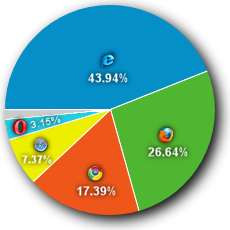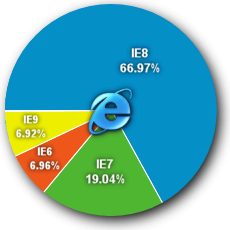Well, it’s been a busy few days in the web browser world! We’ll try and summarize what’s been happening for you!
Internet Explorer 10 Updated
 On Thursday, Microsoft released Windows 8 Release Preview. Along with it came an update to their Internet Explorer 10 browser. This is the browser that will ship when Windows 8 is fully released later this year. Sadly, IE10 isn’t currently available for Windows 7, but we very much hope it will be before too long, as IE10 sees some significant leaps forward for Microsoft’s browser.
On Thursday, Microsoft released Windows 8 Release Preview. Along with it came an update to their Internet Explorer 10 browser. This is the browser that will ship when Windows 8 is fully released later this year. Sadly, IE10 isn’t currently available for Windows 7, but we very much hope it will be before too long, as IE10 sees some significant leaps forward for Microsoft’s browser.
Firefox 13 Out Now
 The latest version of Firefox – version 13 – is now available to download from Mozilla (even though it’s not “officially” released until tomorrow!). Notable changes in this version, according to Mozilla, relate to the “Home” and “Tabs” pages. The “home” page can now be customized with bookmarks, history, sync, and previous session data. The “new tabs” page has also seen a feature introduce that has been knocking around in Chrome and Opera for a while. This feature shows thumbnails of recently/commonly viewed pages
The latest version of Firefox – version 13 – is now available to download from Mozilla (even though it’s not “officially” released until tomorrow!). Notable changes in this version, according to Mozilla, relate to the “Home” and “Tabs” pages. The “home” page can now be customized with bookmarks, history, sync, and previous session data. The “new tabs” page has also seen a feature introduce that has been knocking around in Chrome and Opera for a while. This feature shows thumbnails of recently/commonly viewed pages
Chrome overtakes Internet Explorer
 Statcounter also reported recently that Google Chrome has now overtaken Internet Explorer in terms of market share. According to StatCounter, Chrome now accounts for 32.76% of the worldwide browser market. This compares to 31.94% for Internet Explorer and 25.47% for Firefox. This is the first time that a browser other than Internet Explorer has commanded the largest share of the browser market. Ok, so it’s not a massive lead – in fact, Chrome’s lead is only 0.82%. Still, this is quite an achievement for a relatively new browser, which was first launched less than 4 years ago!
Statcounter also reported recently that Google Chrome has now overtaken Internet Explorer in terms of market share. According to StatCounter, Chrome now accounts for 32.76% of the worldwide browser market. This compares to 31.94% for Internet Explorer and 25.47% for Firefox. This is the first time that a browser other than Internet Explorer has commanded the largest share of the browser market. Ok, so it’s not a massive lead – in fact, Chrome’s lead is only 0.82%. Still, this is quite an achievement for a relatively new browser, which was first launched less than 4 years ago!
Facebook to purchase Opera?
 It’s also been rumored this past week that Facebook may be gearing up to buy the Opera browser!
It’s also been rumored this past week that Facebook may be gearing up to buy the Opera browser!
That’s according to a report from Pocket-Lint.com. The article claims (via unnamed sources) that Facebook is looking to purchase Opera Software. Opera Software are the makers of the long-running Opera web browser. Details are sketchy, but the story claims that Facebook is looking to compete in the web browser war that already has Microsoft, Google, Apple and Mozilla among its big players.
The Opera web browser has historically always had the smallest market share of any of the 5 major desktop browsers. That said, Opera has gained some ground most notably in the mobile web browser market. Facebook is currently very focused on the “mobile” side of their operations. This is due to an increasing number of users regularly using Facebook on their mobile devices. So, Facebook could be about to purchase Opera Software as a shortcut towards making a browser that could compete in the smartphone and tablet space?
The Facebook purchase could actually be very good for the Opera browser. Such a move has the potential to become much more of a “threat” to the other 4 browsers. This in turn will likely see increased development, competition, and a race to strive to produce the fastest, most “standards compliant” browser.
We’ve been closely monitoring Opera developments in recent months. Opera Software are about to release Opera 12, and we’ve been impressed with what we’ve seen so far from the nightly developer “snapshots”. Opera 12 is a substantial improvement on Opera 11 – it’s faster, and far more standard-compliant
MIDAS Booking Software is compatible ALL major browsers
Our browser-based software, MIDAS, is fully supported on Internet Explorer (including on IE10 in Windows 8), Firefox (including v13), Opera (including v12), as well as the current versions of Safari and Chrome.
…and there’s still time to take advantage of our very special Diamond Jubilee discount!
 Microsoft’s Internet Explorer team have just announced that in 2012, their
Microsoft’s Internet Explorer team have just announced that in 2012, their 

 Whilst Microsoft do provide some helpful resources for corporate IT departments looking to migrate from IE6, Microsoft have committed to continue support for IE6 until 2014 (coinciding with the “End of Life” of Windows XP), primarily because of this corporate sector! In our opinion, Microsoft should have ended support for IE6 a long time ago. If they had, it would force corporations and developers alike to upgrade and modernize their software. Ultimately, this benefits the wider Internet community! Developers can then utilize new and emerging web technologies, such as HTML5, CSS3. This in turn provides a better user experience, rather than developers having to instead spend time trying to make their modern software backwards compatible with a decade old obsolete browser!
Whilst Microsoft do provide some helpful resources for corporate IT departments looking to migrate from IE6, Microsoft have committed to continue support for IE6 until 2014 (coinciding with the “End of Life” of Windows XP), primarily because of this corporate sector! In our opinion, Microsoft should have ended support for IE6 a long time ago. If they had, it would force corporations and developers alike to upgrade and modernize their software. Ultimately, this benefits the wider Internet community! Developers can then utilize new and emerging web technologies, such as HTML5, CSS3. This in turn provides a better user experience, rather than developers having to instead spend time trying to make their modern software backwards compatible with a decade old obsolete browser!